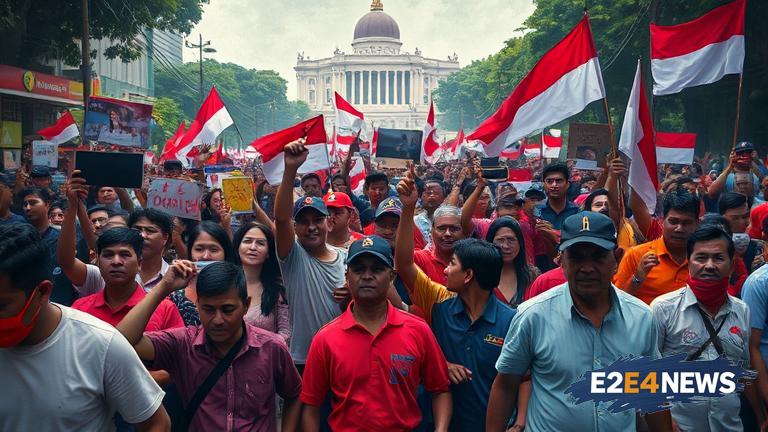The Indonesian government’s recent announcement of austerity measures has been met with widespread protests across the country. The measures, which include cuts to fuel subsidies and increases in taxes, have been seen as disproportionately affecting the poor and middle class. Meanwhile, the privileges of parliament members have come under scrutiny, with many Indonesians feeling that they are out of touch with the struggles of ordinary citizens. The protests, which have been ongoing for several days, have drawn thousands of people to the streets, with demonstrators calling for the government to reconsider its policies. The situation has been exacerbated by the perceived corruption and cronyism within the government, with many Indonesians feeling that the ruling elite is more interested in maintaining its own power and privilege than in serving the needs of the people. The government has responded to the protests by deploying riot police and imposing curfews, but this has only served to further inflame the situation. The international community has been watching the developments in Indonesia with concern, with many calling for calm and restraint. The Indonesian economy has been struggling in recent years, and the austerity measures are seen as an attempt to address the country’s fiscal woes. However, the measures have been criticized for being overly harsh and for failing to address the underlying issues of corruption and inequality. The protests have also highlighted the growing discontent among Indonesians with the country’s political system, which is seen as being dominated by a small elite. Many Indonesians are calling for greater transparency and accountability, as well as more meaningful representation in government. The situation in Indonesia is complex and multifaceted, with a range of factors contributing to the unrest. The government’s response to the protests will be crucial in determining the outcome, with many hoping that a peaceful resolution can be found. The protests have also sparked a wider debate about the role of government and the economy in Indonesia, with many arguing that the country needs to move towards a more equitable and sustainable model of development. The Indonesian government has announced plans to review the austerity measures and to engage in dialogue with protesters, but it remains to be seen whether this will be enough to address the underlying issues. The protests have been marked by clashes between police and demonstrators, with reports of injuries and arrests. The international community has called for an end to the violence and for the government to respect the rights of protesters. The situation in Indonesia is a reminder of the ongoing struggles for democracy and equality in many parts of the world. The protests have also highlighted the importance of social media and other forms of digital communication in mobilizing and organizing social movements. The Indonesian government has been criticized for its handling of the protests, with many arguing that it has been too heavy-handed and that it has failed to address the underlying issues. The country’s human rights record has also been called into question, with reports of abuses and mistreatment of protesters. The protests have sparked a wider debate about the future of Indonesia and the kind of country that its citizens want to build. Many Indonesians are calling for a more just and equitable society, where the rights of all citizens are respected and where the government is accountable to the people. The situation in Indonesia is a complex and challenging one, but it also presents an opportunity for the country to move towards a more democratic and sustainable future.
